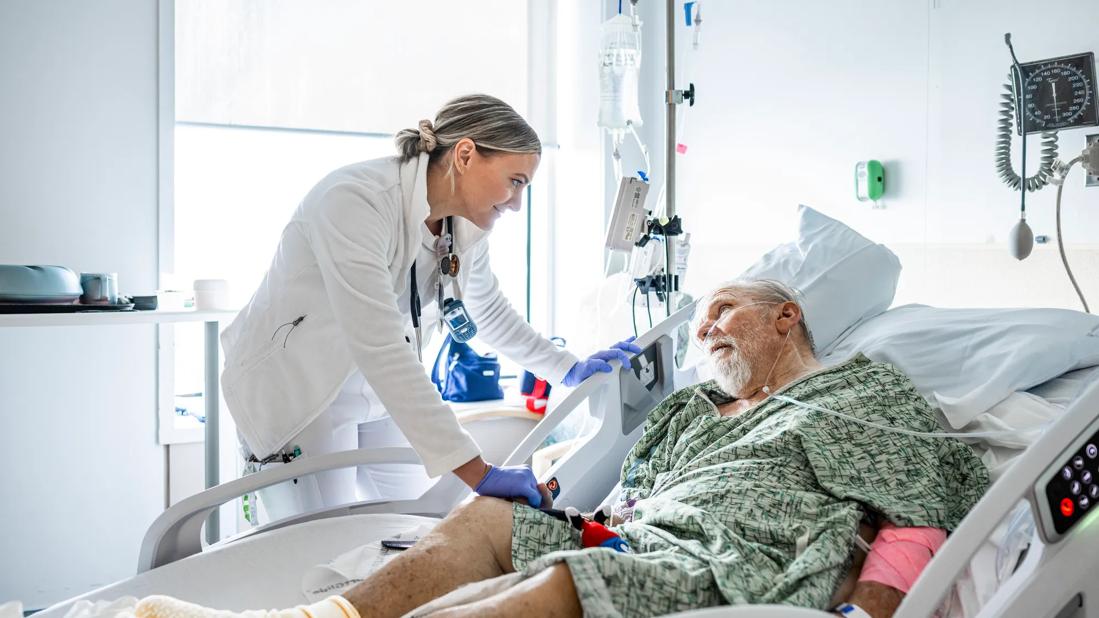Pursuit of knowledge leads to improvements in patient care

For Cleveland Clinic nurses, evidence-based practice (EBP) is much more than a buzz phrase. It is ingrained in everything they do, from training at The Stanley Shalom Zielony Institute for Nursing Excellence to delivering care at the bedside to pursuing research.
Advertisement
Cleveland Clinic is a non-profit academic medical center. Advertising on our site helps support our mission. We do not endorse non-Cleveland Clinic products or services. Policy
The emphasis on EBP runs deep because nurses embrace the concept that conscious use of best knowledge and best practices is crucial for ensuring patient safety. Their own experiences have shown that outcomes are improved when care decisions result from a combination of learning experiences. Nurses use best published research, their own clinical expertise and patient preferences and values.
“In every nursing course we teach, we talk about the evidence base, from expert opinion to consensus guidelines,” says Antoinette Zito, MSN, RN, CPAN, a nurse educator in the operating room at Cleveland Clinic Hillcrest Hospital. “In undergraduate nursing programs, there is a class specifically on evidence-based practice. My vision for the future is that a course will not be necessary because we will have high quality published evidence for the majority of practices that nurses participate in.”
Nancy Kaser, MSN, clinical nurse specialist at Cleveland Clinic’s main campus, agrees. “Compared with other social sciences, the nursing knowledge base is in its infancy,” Kaser says. “But evidence-based practice is now a part of our common nursing language. We’re constantly examining our practice, and we’re encouragingnurses to develop a spirit of inquiry at the bedside.”
In decades past, a lack of research evidence in nursing literature meant that real world practices were heavily reliant on expert opinion. As evidence has evolved and expanded, many practices that once were considered inarguable have fallen by the wayside.For example, early ambulation has replaced bed rest for postsurgical patients. Previously, when new mothers indicated that they planned formula feeding, nurses recorded it without comment, but now nurses encourage breastfeeding because of its established health benefits for newborns.
Advertisement
“Today, nurses play an important role in postsurgical opioid stewardship,” Zito says. “Ten years ago, we didn’t teach about the adverse effects of opioids, such as addiction. Now we educate patients about the risks associated with these drugs because of new evidence that emerged over time.”
Even during the extreme stress of a pandemic, Cleveland Clinic nurses have translated insights and experience into evidence-based advances. The result has been better outcomes for patients. As the pandemic progressed, for example, nurses adopted the practice of prone positioning of COVID-19 patients to improve oxygenation.
Cleveland Clinic encourages the spirit and practice of inquiry among nurses in several ways. Nurses who conduct systematic reviews of the literature on a nursing problem can apply for the Nursing Research Fund – Literature Review grant, which funds time used to complete the process of discovery and dissemination. The institution also supports EBP by sharing literature review findings via posters presented during Shared Governance Day. EBP also is shared at the Nursing Institute’s Annual Research Conference; at a two-day EBP workshop; and through partnerships with local nursing research councils.
The institution also supports EBP through posters that are presented at Shared Governance Day, at the Nursing Institute’s Annual Research Conference, during a two-day EBP workshop, and via partnerships with local nursing research councils. In addition, our Intranet system has an EBP link that includes definitions, algorithms, checklists and other templates, articles in the literature, an EBP model and templates of materials used to review literature. The Zielony Institute’s eJournal club for EBP is unique in that the focus of the review of literature is on strength and quality of the evidence rather than on simply learning about a nursing practice. Nurses complete a quiz after reviewing papers on different topics. They can receive continuing education credit for their work.
Advertisement
“Cleveland Clinic is so rich with EBP resources. As nurses, we have a personal responsibility to stay abreast of the latest evidence and apply it to the care of our patients,” says Zito. “When one of our nurses has an idea for an innovation or a research project, they need to bring it forward. If a nursing caregiver thinks there is a better way to do something, we should look at it. We have the structure in place here to do just that.”
Advertisement
Advertisement

Planning continues with critical, patient-focused input from nursing teams

Strengthening care through targeted resources and frontline voices

Embracing generational differences to create strong nursing teams

CRNA careers offer challenge and reward

An unexpected health scare provides a potent reminder of what patients need most from their caregivers

Cleveland Clinic Abu Dhabi initiative reduces ICU admissions and strengthens caregiver collaboration

Veteran nurse blends compassion, cutting-edge transplant training and military tradition to elevate patient care

Embrace coaching and other tips to be a stronger leader